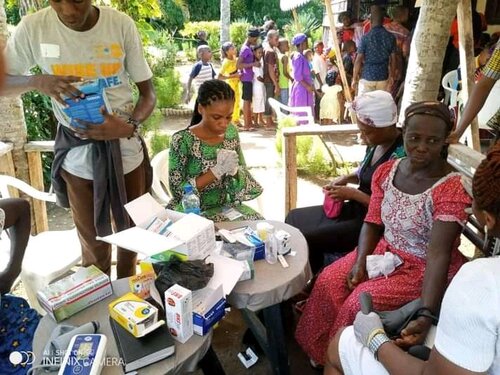Global health leaders and stakeholders gathered in Berlin last...
10 May 2022
As part of Universal Health Coverage (UHC) commitment monitoring, we want to tell the real stories of UHC as experienced by people across the globe. This story comes from Nsikakabasi George, a Public Health Professional in Nigeria.

I am Nsikakabasi George, a Public Health Professional and Health Equity Evangelist residing and working to achieve universal health coverage (UHC) in Nigeria. I love conducting research and cooking Nigerian delicacies, especially Afang Soup. In the last four years, I have utilized my leadership skills to create sustainable impacts and ensure health for all even to the last mile.
Although several efforts and initiatives have been put forth by the Nigerian Government to advance UHC in the nation, there exist numerous challenges and hindrances to achieving this feat stemming from the systems themselves. To get quality health care, you just have to visit private hospitals and facilities which are very expensive but then you get the best of services. Out-of-pocket expenditures for health is the order of the day, and it is seemingly peaking at an overall of about 70% of the total contribution for health. I believe there is still a lot to be done if we are to achieve UHC as a country, and this will involve us prioritizing health and ensuring full implementation of health acts and provisions.
“Although several efforts and initiatives are put forth by the Nigerian Government to advance UHC, numerous challenges and hindrances to achieving it still exists, stemming from the systems themselves.”
Financial difficulties when accessing health care services remains a major impasse for the Nigerian population, and vulnerable people are the worst hit. Although this remains the case, cost-effective methods exist to enable individuals to achieve better health outcomes. It is worth noting that a lot of diseases are linked to water, sanitation and hygiene (WASH), especially neglected tropical diseases and other infectious diseases. Thus, a significant effort to promote better WASH, which is very cost-effective, will in turn yield gains in reducing morbidities and mortalities.

In the above picture is my friend, Archibong Bassey, with whom we co-planned a WASH intervention to an orphanage home in Calabar, Cross River State. The intervention included but was not limited to proper hand washing, sanitation, risk communication and health promotion. We were able to equip the children and staff of the orphanage home with tools and information on how to stay healthy, avoid diseases and experience catastrophic health expenditures.
To reduce the mortality, morbidity and disabilities from maternal and childhood diseases, we also work on immunization, health education and promotion and quality assurance. I was posted to the primary health care center Creek Town in Cross River State to support the community health workers in a very remote and short-staffed area. We assisted the health workers in providing health care services to as many individuals and families who previously had no access to such. We ensured the quality of the services provided so that individuals and families can experience better health outcomes.
Note: This story may have been edited for clarity and shortened for fit on the UHC2030 webpage.
Categoría: Civil society and communities
